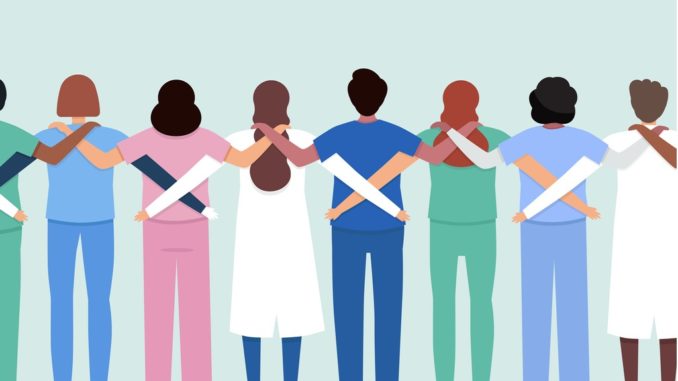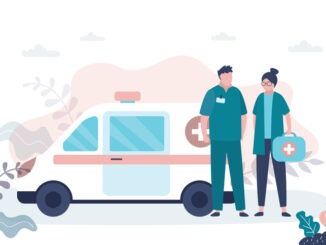
Karen Garry, adviser with not-for-profit social enterprise organisation PCC, discusses how additional roles could benefit your practice

We know that the introduction of the additional roles reimbursement scheme (ARRS) for primary care networks (PCNs) will grow capacity in general practice to address the unsustainably high workload that has put so much pressure on GPs.
Bringing in additional, patient-facing, clinicians, allied health care professionals and personalised care roles enables patients to see the right professional at the right time without going through an external referral process. ARRS brings specialist skills directly into practices along with general clinical knowledge and skills that can add capacity to practice GP and nursing teams. It increases choice for patients, who can be seen more quickly and for longer, and allows GPs to focus on people with complex needs.
But that is not all; the advent of additional roles in general practice creates real opportunities for achieving the other PCN priorities of developing personalised care and tackling inequalities – particularly for those disproportionately affected by COVID-19. Already, in the pandemic, the social prescribing link worker role has come into its own, connecting people with essential community services and supporting psychological and social needs.
The flexible recruitment of additional roles gives PCNs a chance to do things differently in general practice by looking at the needs of their local population and creating a skill mix within the multi-disciplinary team (MDT) that will serve them best. It means being open to recognising gaps in existing clinical knowledge and expertise and willing to work with, and learn from, disciplines that are new to general practice. The benefits they will bring are new ideas, and ways of doing things, that may inspire – as well as challenge – team members across your practices.
Personalised care
Several of the new roles bring knowledge and experience of providing personalised care that is responsive to the needs of individual patients. Allied professionals such as first contact physiotherapists, podiatrists and dieticians help create integrated and tailored care programmes for patients through the MDT. They provide personalised specialist treatment and can facilitate behavioural change in patients through health education and self-management techniques for long-term conditions, preventing escalation of conditions and reducing hospital admissions.
Along with social prescribing link workers, and health and wellbeing coaches, they build care around each person using shared decision-making processes. As part of the MDT they can support colleagues to improve their skills and understanding of personalised care and behavioural approaches to improving health outcomes by modelling shared decision-making in practice.
Care co-ordinators help people with highly complex needs to manage all their health and care services. Co-ordination can eliminate unnecessary appointments, procedures and tests, and patients feel more empowered and actively engaged in their treatment. Personalised care, and the use of shared decision-making techniques, support the move towards people taking more responsibility for their own health and becoming less dependent on general practice.
Care co-ordinators play a key role in personalised care by co-ordinating interventions in the MDT, ensuring records and information are updated and shared effectively to provide the seamless integration of services around the person.
Tackling inequalities through community connections
COVID-19 has highlighted how economic and social disadvantage impacts directly on health and wellbeing. Tackling inequalities has become a priority for PCNs and additional roles can play an important part in connecting practices to individuals, groups and potential partners in local communities.
Social prescribers get to know local benefits and debt advice providers, food banks, employment projects, and befriending services, while occupational therapists link with housing providers, environmental services, transport providers, schools and employers. By providing community health monitoring, paramedics can connect with sheltered housing schemes for older people and supported housing for people with learning difficulties, or in drug and alcohol recovery, or homeless people.
Dieticians can connect with schools and parents’ groups to provide health education or cooking classes, and provide support to weight loss groups. Health and wellbeing coaches link with physical activity providers, cultural and interest groups.
The connections between practices and people in communities can grow and be strengthened when professionals in MDTs understand the context of the local area and the wider social and economic issues that create barriers to people’s health and wellbeing. Sharing the intelligence everyone gathers from appointments with patients, home visits, personalised care and working with partners in the community can help the MDT identify unmet needs, and the PCN to develop, or access, services that are accessible to everyone in the neighbourhood.
This intelligence can also be shared upwards, into the integrated care system, to inform decisions that can tackle the underlying causes of inequality and improve health outcomes for all.
Things to think about
Welcome new professionals – many will not have worked in general practice before; they need time and support to familiarise and acclimatise. Who in your teams could help?
Share your PCN vision for the MDT and how you see new professionals working together as part of individual practice teams and across the PCN.
Inform new staff about the other roles you are introducing – what they do, where they specialise, how their services might complement each other and align around patients as part of the MDT. Do not assume they already know, and remember that they might not feel comfortable to ask at first.


Be the first to comment